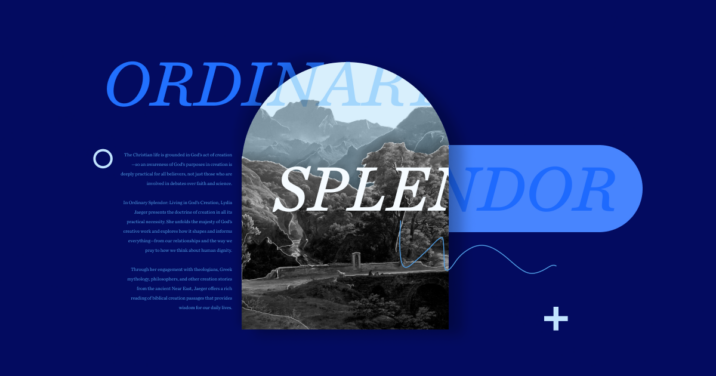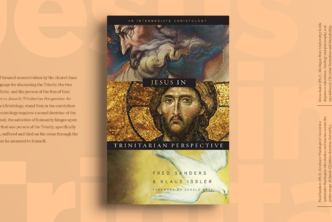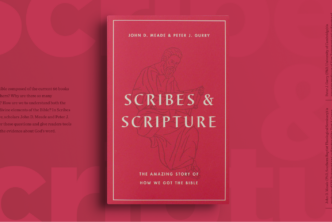Here is a doctrine of creation that focuses—rightly in my opinion—less on origins than on ongoings, namely, the practical consequences of our createdness for everyday human existence. Jaeger argues convincingly that human flourishing, in every aspect of our lives, depends entirely on living in dependence on God, and along the grain of the created order. Ordinary Splendor confirms Calvin’s belief that there is no knowledge of what it is to be human without knowledge of God the Creator.
—Kevin J. Vanhoozer, Trinity Evangelical Divinity School
Navigating life at the crossroads of science, faith, and philosophy is challenging. Lydia Jaeger, a seasoned navigator in these realms, has gifted us with her work, Ordinary Splendor: Living in God’s Creation. I thoroughly enjoyed my recent interview with Jaeger, who told me that her book was inspired by her dissertation. As a brand-new publication of Lexham Press, this title serves as an insightful exploration of the doctrine of creation and of its critical place in the practical lives of all believers.
Book overview
Ordinary Splendor is a masterful tapestry interwoven with threads of theology, Greek mythology, philosophy, and creation narratives from the ancient Near East. Jaeger’s expansive lens offers a fresh perspective on the biblical creation passages, delivering a rich and diverse reading experience that goes beyond the surface level of the Scriptures.
The book follows a compelling progression, starting with recognizing God as the absolute origin and ending with entering into God’s rest. Each chapter in this progression presents a unique aspect of creation, from accepting existence as a gift and understanding human dignity to embracing fully God’s gift of human sexuality.
A closer look
Jaeger’s strengths lie in her ability to bridge seemingly disparate domains of knowledge and make them accessible to her audience. Through engaging and sophisticated writing, she skillfully unpacks complex philosophical and theological ideas, always anchoring her arguments in the practical realities of Christian life. While I believe so much of her book is worth your time and attention, let’s review a few noteworthy chapters in her text.
Her chapter “Understanding Human Dignity” stands out as a particularly powerful portion of her work. Here Jaeger examines the idea of inherent human value within the context of God’s creation. In fact, she adds that all humans possess value because of their being created and ordered by God. This exploration offers an enlightening perspective on how we view ourselves and others, thus impacting our relationships and how we go about our lives every day. She writes,
Human beings are the result of the Creator’s deliberate plan: they are not an accident of history, lost in the unblinking vastness of a hostile universe. No, God purposefully resolved to create us: “Let us make man in our image” (Genesis 1:26). The second creation account even shows God working with his hands to form the first man. As a result, we can be sure that God wants us to exist, and so trustingly commit ourselves to the plan that our Creator has wrought for humanity. (60)
In “Accepting Your Limits,” Jaeger articulates the paradoxically liberating concept of recognizing and embracing human limitations. This, she posits, is not to be seen as a barrier or boundary to existence but should rather be embraced. Practically, each person ought to consider limiting their desire to be all things at all times to all people, because owning one’s finite limits is a fundamental step in understanding our place within the grand narrative of creation. Jaeger again:
Thinking about our finite nature reaches its full depth when we grasp the fact that the limits we encounter as human beings inside creation ultimately point us to the limit that is constitutive of our existence: we are created. Not only are we forbidden from clawing our way up to God’s level, but it is impossible for us to do so. The fact that human beings are neither omnipresent, nor eternal, nor almighty, serves as a reminder of our status as created beings. As such, we are always secondary to our Creator; only by this dependence on the One who made us can we understand ourselves; only in this way can we live. (107–08)
“Distinguishing between Woman and Man” and “Embracing a Fully Human Sexuality” are perhaps the most audacious chapters in the book. Here, Jaeger confronts contentious issues head on, offering thoughtful and measured insights that do not shy away from the controversies often associated with these topics.
Since nothing in creation is able, on its own, to express all the fullness of what it means to be created, man and woman must complement each other in order to fully signify what it is to be human: we are called to represent God and must live in relationship with him. (129)
Personal reflections
Reading Ordinary Splendor is a transformative experience. Jaeger’s work doesn’t just change the way you think about the doctrine of creation; it changes the way you approach your daily life. Her work instills a greater appreciation for the complexities and beauties of God’s creation, and a deeper understanding of how this awareness impacts everything from prayer to human relationships. Jaeger’s words invite us to move beyond passive acceptance, to engage more fully with our relationships, our prayers, and our sense of self.
Conclusion
Lydia Jaeger’s Ordinary Splendor: Living in God’s Creation is more than a book—it’s a call to reflection and an invitation to view our existence in a new light. Through her astute exploration of creation, she has successfully presented a resource that is both intellectually stimulating and spiritually nourishing. This book is a worthy addition to any believer’s library who is looking to deepen their understanding of their faith and the world they inhabit.
About Lydia Jaeger
Lydia Jaeger holds the dual roles of lecturer and academic advisor at Nogent Bible Institute in Nogent-sur-Marne, France. She often collaborates with other authors and is a prolific writer herself. Other books of hers include What the Heavens Declare (Wipf and Stock, 2012) and Einstein, Polanyi, and the Laws of Nature (Templeton, 2010). Her ability to seamlessly blend science, faith, and philosophy distinguishes her work, and she continues to contribute significantly to conversations at the intersection of these fields.







